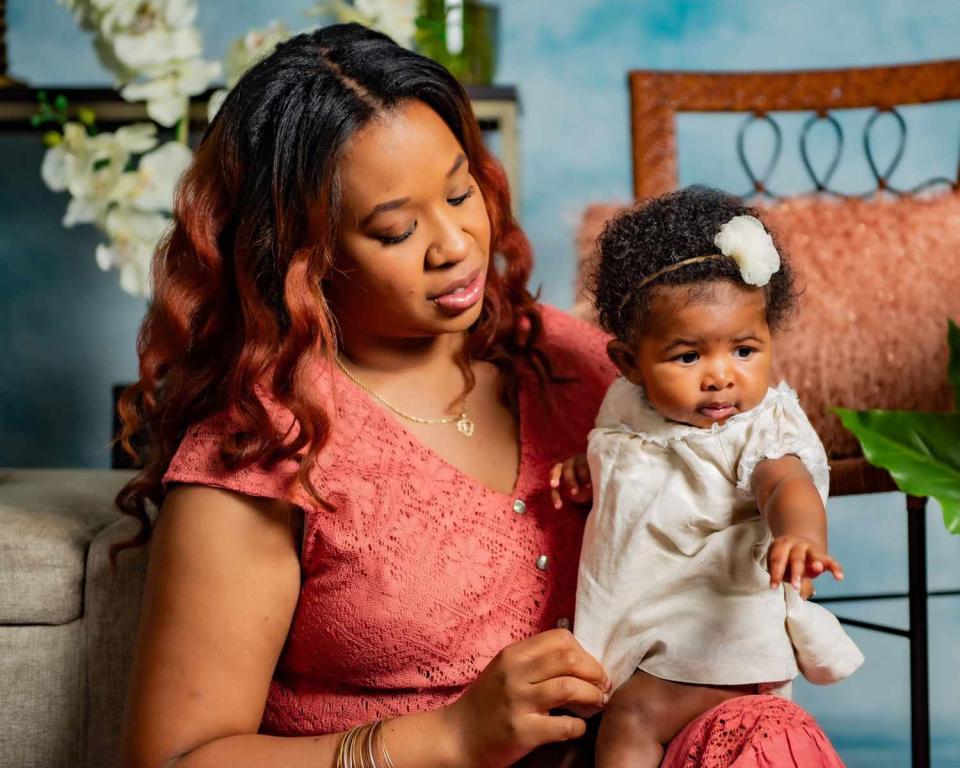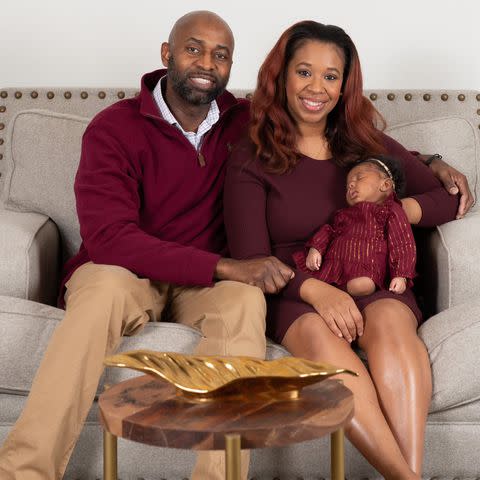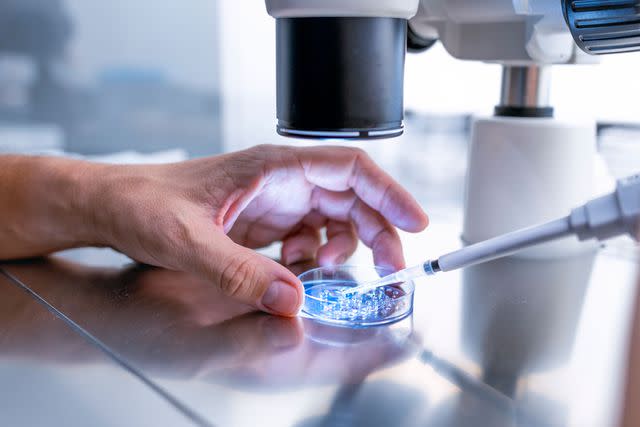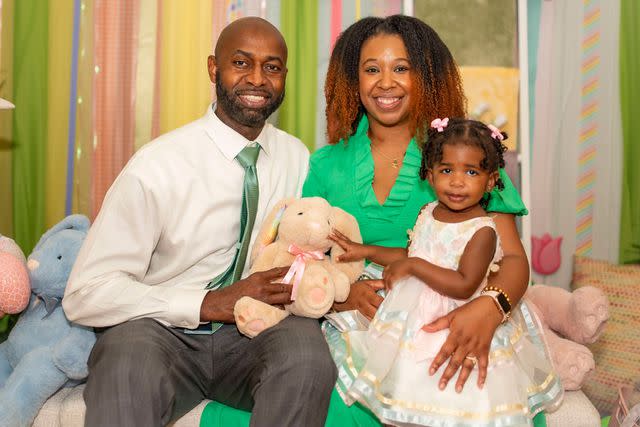Mother’s IVF Journey Halted Due to Alabama Ruling: 'Our Sadness Turned to Complete Anger' (Exclusive)
"We just never thought that it would really affect us, but it did,” Latorya Beasley tells PEOPLE

Lamar Beasley
Latorya Beasley and her daughter LyricLatorya Beasley’s IVF clinic was closed due to the Alabama Supreme Court's ruling that frozen embryos are now legally considered children
The 38-year-old was days away from undergoing an embryo transfer before the decision halted her family's plans
She is now sharing her IVF story and encouraging people to vote to protect women's reproductive rights
A mother’s hopes of expanding her family have been halted in the wake of the Alabama Supreme Court's ruling that frozen embryos are now legally considered children in the state.
After struggling with infertility, Latorya Beasley — a social worker from Birmingham, Alabama — and her husband Lamar decided in 2020 that IVF was their best option for starting a family.
IVF, or in vitro fertilization, is a medical procedure where “mature eggs are collected from ovaries and fertilized by sperm in a lab,” the Mayo Clinic explains. “Then a procedure is done to place one or more of the fertilized eggs, called embryos, in a uterus, which is where babies develop. One full cycle of IVF takes about 2 to 3 weeks.”
Despite delays due to the COVID-19 pandemic, Beasley started her first round of IVF at the end of 2021 and had a successful transfer in April 2022, which led to the birth of her daughter Lyric in 2023.
At 38 years old, Beasley says she and her husband knew they wanted children close in age, so in October 2023 she made a doctor’s appointment to discuss preparations for another round of IVF.
“When we first started, everything was going pretty smoothly,” she tells PEOPLE. “But we started hearing some of the chatter that was going on in February 2024.”

Lamar Beasley
Latorya Beasley and her husband Lamar and daughter LyricThat chatter involved a possible Supreme Court ruling about IVF — but she didn’t expect it to be life-changing for her family.
“I started to get a little concerned, but of course I'm a pretty typical American where we think that things don't affect us,” Beasley admits. “The week that we started prepping for transfer, my husband even made the comment, ‘Well, we're on medicines now, surely it won't affect us at all.’ We just never thought that it would really affect us, but it did.”
On February 16, the Alabama Supreme Court ruled that frozen embryos are legally considered children. The decision came as a result of a wrongful death lawsuit brought by couples whose frozen embryos were destroyed at a fertility clinic in December 2020 when a patient entered a cryogenic nursery storage unit and removed several embryos.
Due to the decision, “no healthcare provider will be willing to provide treatments if those treatments may lead to civil or criminal charges,” American Society for Reproductive Medicine (ASRM) said in a statement condemning the ruling.
“The day that the first clinic shut down, which was UAB [University of Alabama at Birmingham], I was in the doctor's office and the first clue that something wasn't right was everybody seemed panicked,” Beasley recalls. “The patients seemed a little panicked and just in a disarray.”
She continues, “I go in and my doctor, she just didn't look right. And she's like, ‘Yeah, you may want to call Lamar.’ She's like, ‘As of right now, we're moving forward, but this court ruling could possibly affect your transfer.’”

Getty
Doctor preparing embryo cultivation plates.Never miss a story — sign up for PEOPLE's free daily newsletter to stay up-to-date on the best of what PEOPLE has to offer, from celebrity news to compelling human interest stories.
Shortly after that conversation, Beasley’s clinic ultimately closed, and her scheduled transfer, which was set for March 4, was canceled.
“We were right there,” she says. “I was literally just a couple of days out from the transfer.”
“Initially, it was just sadness,” she adds. “I think that's kind of how infertility goes. You just kind of go on this range of emotions all the time. One day you're high because you're very hopeful, and then the next day you may be down because you get some type of news. So we were just very sad, but eventually our sadness turned to just complete anger.”
Beasley says she’s always paid attention to politics. So when Roe v. Wade was overturned by the U.S. Supreme Court in June 2022 after nearly 50 years, effectively eliminating a pregnant person's constitutional right to an abortion in every state, she “knew what was at stake.”
“But again, you don't think that it'll happen to you,” Beasley says, noting that she realized just how much of an impact the ruling had on women’s reproductive rights, beyond just abortion.
“You start to wonder, well, what could be next? I think that was just what really ignited the anger, like how did we get here? How can we allow this to happen?”

Lamar Beasley
Latorya Beasley and her husband Lamar and daughter LyricSince her transfer was canceled, Beasley admits that she’s “gone into mama bear mode” and is willing to do whatever it takes to see change happen.
“I'll advocate. I'll tell my story, as uncomfortable as it may be. I'll tell it a thousand times if I have to,” she says.
Beasley recently attended the State of the Union as a guest of first lady Dr. Jill Biden. She has been sharing her story with lawmakers at the state and federal level, including a roundtable convened by U.S. Department of Health and Human Services Secretary Xavier Becerra.
“I just hope that they'll hear my story and pay attention. I hope that they'll get out and exercise their rights to vote because you have to protect just women's fundamental rights,” she stresses.
In the meantime, Beasley is keeping her fingers crossed at the hope of expanding her family soon through IVF.
“We still have not transferred today,” she tells PEOPLE. “When things stopped in Alabama, we stayed on medicine for a little longer with the hopes that I would be able to transfer once everything opened back up. But unfortunately, we don’t know 100%."
For more People news, make sure to sign up for our newsletter!
Read the original article on People.

